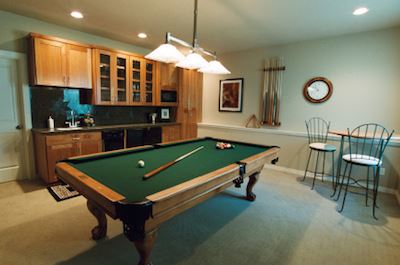Are you living on top of an unfinished basement? Have you been wondering whether it’s time to move due to your lack of space? Sometimes the perfect place to look for more space isn’t in a new neighborhood, it’s right below you.
Don’t let the dark, damp space below your floors prevent you from turning your home into its fullest potential. Finishing your basement has one of the greatest returns on investment when it comes time to sell, according to Remodeling Magazine.
Whether you’ll be hiring a general contractor or renovating your basement yourself, you will have a few things to consider before any work is performed.
Your Heating and Cooling System
Most homes with unfinished basements house your furnace, air handler, and other HVAC equipment. When designing your basement floor plan, it is essential to develop a way to enclose the equipment for aesthetic and functional reasons without closing them off completely. Many finished basements incorporate a utility closet or mechanical room to help conceal the equipment from the new living space.
Because you will be enclosing your heating equipment behind closed doors, it’s important to ensure it is properly ventilated to meet all gas code requirements. The amount of cubic feet needed to properly ventilate the space depends on the BTU output of the equipment.
Unfinished basements are often not conditioned, which means ductwork may not be in place to supply heating or cooling. That means it might require working with a professional to determine where existing equipment, supply and return ducts are as well as the proper placement of new ducts, registers, and other components of the system. This may require a variety of permits and test to ensure the work is performed properly up to code.
Why Old Equipment May Not Work
A skilled heating and air conditioning technician is needed to determine the size of equipment you will need for your home with the additional finished space. A load calculation will be performed to determine the BTUs needed to heat and cool the space.
By finishing off your basement, you will be adding several hundred square feet to your current living space. You will need to determine if your current system can handle the additional demand, or if you’ll be required to up the capacity. If an upgrade is required, can you add supplemental systems to accommodate the new space, or is a new system needed in its entirety?
In some cases, an upgrade to your existing heating and cooling system may be needed. In other cases, it may make more sense to simply add a second heating and cooling system to your new space. Which is the better choice depends on your situation and preferences. If your equipment is relatively new, it may make more sense to add a second system. If you’re upgrading, be sure to select one that improves efficiency and performance.
Basements are notorious for moisture issues. So be sure to consider installing equipment to help control moisture problems during the process. A dehumidifier may not be the only solution. Some may actually cause moisture problems in a finished basement, pulling moisture through basement walls. It’s important for a contractor to consider all options of drainage and waterproofing to keep your underground living areas safe and secure.
Thinking of renovating your unfinished basement? Can your heating and cooling system handle the new load?

